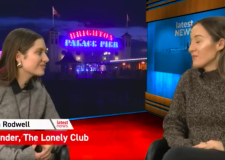Film: Ben Wheatley

Brighton has the honour of being home to one of the most present innovative filmmakers. He talks to Holly Cozens about his latest feature, A Field In England
Without spoiling it for those who have yet to see it, what is A Field In England about?
“There is a mixture of roundheads and cavalier soldiers and that’s about it really. And you’ve got Whitehead [Reece Shearsmith] who is on a mission to get back some paperwork that has been stolen from his master.”
How much of your films do you like to leave to the audience’s interpretation?
“I’ve always thought that you would pitch at what you would expect from a movie yourself. I like movies to make me think so I make movies like that. As soon as it’s literal then it’s not scary anymore, unknown things are terrifying. I think the problem people have with my films is that they straddle genre filmmaking and sometimes dip into that arthouse side. So I get a bit of moaning but I ignore it generally.”
Do you feel A Field In England makes a comment on modern society?
“Yeah, you have to do that when you’re making art, you have to put it in the context of where you’re living. Otherwise if you’re just making films about films they’re not very interesting and you’re kind of missing the point. Take Romero’s Dawn Of The Dead, it’s not a zombie film or a comment on other zombie films that have come before it, it’s talking about consumerism, the potential collapse of America due to OPEC, civil war and all these things.”
Stanley Kubrick once said that ‘sanitised violence in movies has been accepted for years. What seems to upset everybody now is the showing of the consequences of violence’. With prominent acts of violence running through your films, do you agree with this statement?
“Yeah, hiding it and showing that it doesn’t have an impact is something I don’t agree with. I think the thing about the stuff in my films is that there’s no way you would come away from that thinking it would be good to do it or repeat it. The danger comes from when you do a film and lots of people get killed and they don’t bleed, if nothing happens to them or there’s no consequence to it. Half-assedly dealing with violence is more of a problem than dealing with it straight on.”
Are there any filmmakers in particular who have influenced your work substantially?
“I don’t know, in this film there’s bits of Peter Watkins and Kevin Brownlow, generally I’ve got a spattering of things lifted off of Scorsese and Peckinpah and those ’70s filmmakers too. I’m not like a post-modern filmmaker who references stuff and expects people to go: ‘Ah, yes I remember this from this film’, I don’t really work like that. It’s that you write the story and make the film and things creep in from the edges. It’s not conscious.”
So the future, you’re making Freakshift and writing Silk Road for HBO, what film/films attracted American interest?
“With Silk Road it was Kill List that got it made. They saw Kill List and approached me and said ‘we want something like that’. With Freakshift it was an ongoing thing, it was us writing lots of scripts. We wanted to make something that would be commercial in the same way that we wanted to make A Field In England, something that’s left of field and odd because they’re all different flavours of filmmaking.”
Last quick question, the penis scene: real or prosthetic?
“Ha ha, prosthetic yeah. I wouldn’t get it out in front of a camera so I don’t expect them too either but they were kind of nervous about being misrepresented! It’s a tricky one because I thought they were quite generous but I’m not experienced in the world of these things!”
A Field In England is showing now at Dukes@Komedia and available to buy on DVD & Blu-ray
Photo Credit: Dean Rogers





















